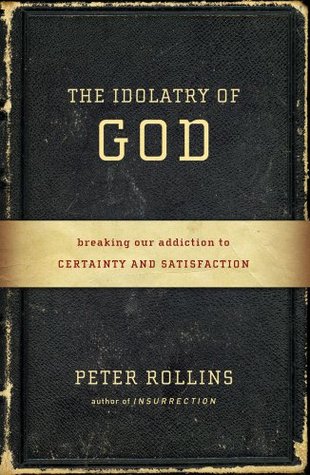More on this book
Kindle Notes & Highlights
Read between
January 14 - February 7, 2018
what if Christ does not fill the empty cup we bring to him but rather smashes it to pieces, bringing freedom, not from our darkness and dissatisfaction, but freedom from our felt need to escape them?
The church then takes its place beside every other industry that is in the business of selling satisfaction. Religious hymns become little more than advertising jingles, and the clergy come to resemble slick salespeople presenting their god-product to the potential consumer.
An Idol is not an Idol because of some property a particular object has; it is an Idol because we project an absolute value onto it.
What we see taking place in the church today is the reduction of God to an Idol, that is, to a thing that will satisfy us and fill the gap we feel in our hearts.
Original Sin can be understood very simply as the sense of loss that all humans experience in the process of coming to self-awareness, while Idolatry refers to any object that we imagine can fill this inner void.
we become little industries dedicated to the creation of Idols.
Total Depravity—a phrase that does not mean there is no good within us, but instead refers to the idea that there is no part of our existence that is not marked by and influenced by the effect of this separation and alienation.
it is also destructive because it can put us into conflict with others whom we believe have actually gained the satisfaction that eludes us.
However, instead of seeing Christ as the apocalyptic destruction of this whole approach, these diagrams see Jesus as a more effective way to bridge the gap. These diagrams thus obscure the truth by calling the Idol “God.” In this way, the contemporary understanding of “God” is nothing more than a mask worn by the Idol.
In terms of Christianity, one is invited to attend conferences, read the latest book, pray more, read the Bible more, worship more, ad infinitum. The reason you don’t feel like you have crossed the chasm is because there is something you need to do first, some supplement is required.
Each of these strategies—deferral, repression, and disavowal—is employed by us to avoid a confrontation with the truth: our lives are not fulfilled; we are still seeking things in addition to our religious commitments; our religious beliefs have not provided us what they seemed to promise.
For instead of God being that which fills the gap at the core of our being, we shall soon discover something much more amazing and liberating: namely that the God testified to in Christianity exposes the gap for what it is, obliterates it, and invites us to participate in an utterly different form of life, one that brings us beyond slavery to the Idol.
We cannot come to self-awareness without giving that awareness some content, any more than we can “see” nothing. We can, of course, have the capacity to see, just as we can have the capacity for self-awareness. But just as actually seeing means that we perceive something, so self-consciousness means being conscious of something. That which we are conscious of in ourselves is called the ego. This ego is the image we have of ourselves, the image that we present on a daily basis through work, recreation, and social media.
Is this not the logic we see play out in our own lives on a daily basis? “Do not show me the suffering that takes place in the dairy industry, for I love animals so much that I cannot bear to see such pain” or “Do not tell me where this shirt was made because I love children too much to hear of their horrific abuse in sweatshops.” Here our “beliefs” are nothing more than a form of Unbelief—they are the story we tell ourselves about ourselves in order to avoid the truth. It is Unbelief, because it is fully affirmed as what we believe, while being that which covers over what we actually do
...more
Our real beliefs are generally not to be found at the level of ego; rather they are more like the operating system of a computer, they are the heart of the machine that causes it to act in certain ways.


